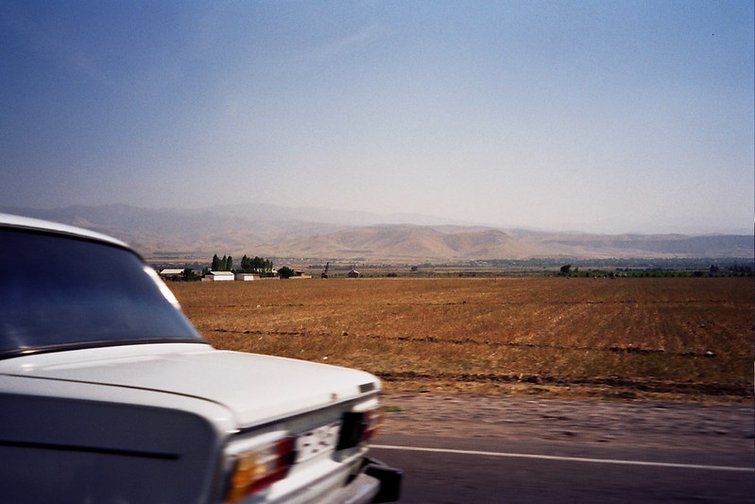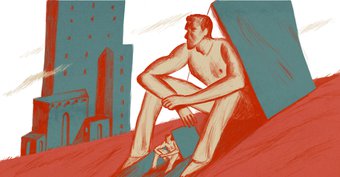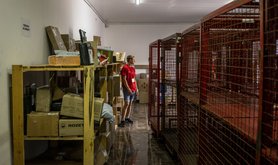
'A small ray of hope': an urgent chance to decriminalise homosexuality in Uzbekistan
As long as the country’s Article 120 exists, said one young man, ‘we will live in fear and homophobes will have power over us’

“Since childhood I have always known that I’m different. Deep down I feel lonely, as if I am a foreigner in this world.”
So spoke Rustam*. Like thousands of other gay and bisexual men in Uzbekistan, he learnt early on that, unless he hides his sexual identity, he risks tarnishing his family name and losing his loved ones. “What I experience, what I feel, my pain, everything stays inside me. I cannot even tell my friends and family. Their hatred of homosexuals is endless,” he adds.
Rustam also knows no one would be punished for subjecting him to abuse or discrimination; in fact, he could easily be imprisoned for being gay.
In Uzbekistan, homosexuality is illegal. Article 120 of the country’s criminal code punishes consensual sexual relations between adult men by up to three years in jail.
Impunity
Besides Turkmenistan, Uzbekistan is the only former Soviet republic where same-sex relations remain a punishable crime – a hangover from Soviet legislation introduced in the 1920s and 1930s. This is despite many other Muslim-majority countries having decriminalised homosexuality, including Uzbekistan’s neighbours – Kazakhstan, Kyrgyzstan and Tajikistan – as well as Azerbaijan and Turkey.
But instead of committing to improving the lot of gay and bisexual Uzbekistanis, the country’s government officials and politicians have on many occasions expressed homophobic views in public. This reinforces widespread stereotypes and condemns members of the LGBT+ community in the country to live in fear of discrimination, extortion, imprisonment, and even violence.
A case in point is Uzbekistan’s new draft criminal code, which has been under development over the past few years. While human rights organisations have repeatedly urged Uzbekistan to use this opportunity to decriminalise homosexuality, instead the content of Article 120 has simply been moved to Article 154 – in a newly created chapter called ‘Crimes against family, children and morality’ – with the previous wording unchanged.
“This article gives people the right to abuse and discriminate against us with impunity,” one young man bitterly remarked. “As long as it exists, we will live in fear and homophobes will have power over us,” he concluded.
"I have never been beaten and intimidated like that in my entire life. I wanted to die to free myself from this torture"
Alisher Kadyrov, the head of the Uzbekistan National Revival Democratic Party, declared on his Telegram channel earlier this year that the country’s laws do not go far enough in criminalising homosexuality. Uzbekistan should “prohibit all forms of propaganda of homosexuality”, Kadyrov said, and the criminal code article “should stipulate compulsory treatment, imprisonment, revocation of citizenship, and deportation”.
In March last year, the chief consultant of Uzbekistan’s Presidential Security Council, Okil Ubaydullaev, told experts of the United Nations Human Rights Committee that homosexuality is a “lifestyle” that is “not approved by Islam” and “not in keeping with the Uzbek mindset”, adding that the general public is strongly opposed to decriminalising same-sex relations.
Despite this, in October 2020 Uzbekistan was elected to the UN Human Rights Council, whose members are expected to “uphold the highest standards in the promotion and protection of human rights”.
Living in the shadow of abuse and extortion
A young Uzbekistani man who was imprisoned under Article 120 in recent years reports that, during pre-trial detention, he was regularly subjected to violence by other detainees, while the guards looked the other way. He recalls that the days spent in pre-trial detention “were the most awful and disgusting of my life”. Likewise, when he first arrived at the penal colony, officers beat him and attempted to rape him with a truncheon, while he was treated with hatred and contempt by fellow inmates and prison guards.
Those suspected or convicted of same-sex relations have the lowest status in the informal but strictly imposed prison hierarchy in Uzbekistan. Guards and fellow prisoners regularly force them to carry out all sorts of demeaning work such as cleaning dirty toilets with their bare hands. “Article 120 of the criminal code keeps thousands of people in fear every day,” Shukhrat* told me, adding that “this article turns us into outsiders and forces us to live in the shadows”.
Unsurprisingly, Article 120 has also been used against heterosexual men. From exile in France, the Association for Human Rights in Central Asia has documented cases of police officers extracting large bribes from pious Muslim men by threatening to open cases against them under Article 120.
According to Uzbekistan’s Ministry of Interior, between 2016 and 2020 a total of 44 individuals were convicted under Article 120, with 49 people currently serving prison terms for sentences related to it. But the criminalisation of homosexuality has implications that go beyond the number of convictions under Article 120. Police officers often use the threat of charging gay and bisexual men under the article, or of disclosing their sexual identity to family members and neighbours, in order to extort money from them.
"We live in the centre of Eurasia, but it’s as if we lived on a different planet"
Ravshan*, a young bisexual man, was detained after police burst into his apartment and filmed him and his partner having sex. The officers took Ravshan to the local police station, where “they suspended me from the ceiling using handcuffs, severely beat me, and tried to rape me with a truncheon”. After that, they laid him on the floor and an officer jumped up and down on the young man’s stomach.
Ravshan recalls: “I have never been beaten and intimidated like that in my entire life. I wanted to die to free myself from this torture”. When police threatened to imprison him under Article 120 unless he gave them $2,000, he paid up and was released. And it is not uncommon for the police to coerce gay and bisexual men to reveal details about their wealthier friends and partners. Ravshan later realised that his partner had cooperated with the police and set him up, possibly in order to avoid being himself charged and jailed.
Clearly, when in danger, gay and bisexual men cannot rely on the police and are left to their own devices. Take the case of Komil*. He provided anonymous online support to LGBT people in Uzbekistan. Last year, he started receiving death threats online. The callers somehow managed to figure out his identity and, one day, Komil noticed that he was being followed on his way home from work. In September, someone appeared at Komil’s house and knocked at his bedroom window in the middle of the night. As he heard the sound of a gun being loaded, Komil screamed at the top of his lungs and the person disappeared. The following day, however, he received another message to his phone: “We will destroy you and give your blood to the dogs!”
Related story
Like many others who have been targeted by homophobic activists, Komil did not report the incident to the police. In addition to the real risk of imprisonment and torture, there are credible allegations that many police officers collude with homophobes, who often disseminate the names and contact details of gay and bisexual men on internet-based messaging services, sharing videos of beatings and intimidation. This practice has continued with impunity for years.
“We live in the centre of Eurasia, but it’s as if we lived on a different planet, where it is normal to hate and humiliate, imprison and punish, discriminate and kill people simply for who they are,” says Shukhrat.
Moreover, the ongoing criminalisation of homosexuality and the widespread homophobia in society translate into gay and bisexual men being afraid to undergo HIV tests, despite the fact that they are a high-risk group and Central Asia is considered a HIV hotspot. This is because staff at HIV clinics have frequently disclosed information about their clients’ sexual orientation and HIV status to family members.
An outreach worker at one of those facilities recalled to me how “Ivan* did an HIV test. Staff at the centre asked him for his phone number. Two days later they rang and said he was HIV positive. At that point, they threatened to send the police after him and reveal to his family that he is gay, in case he didn’t show up at the centre immediately to give them his full contact information”.
While a draft presidential decree indicates the new criminal code will enter into force on 1 January 2022, until Uzbekistan’s Parliament approves it there is still a window of opportunity for change. Ending the criminalisation of homosexuality would help gay and bisexual men in Uzbekistan step out of the shadows.
The fact that some people have broken out of this hateful mindset gives some reason to hope. For example, the mother of a gay man recalls: “When I found out that my son is gay, I was thrown into a blind panic. I dragged him to imams and to psychologists to try to ‘heal’ him. I caused him so much pain. I often regret this. Now I understand that homosexuality is not an illness. My son is healthy. Now I only want my son to be happy”.
Rustam, for one, does not want to give up. “Despite everything, I still feel a small ray of hope that the authorities will remove this terrible article from the criminal code and that in the future we will be able to live our lives without fear of imprisonment and discrimination”.
The names of the men interviewed for this article have been either changed or left out to protect their identities.
Read more
Get our weekly email





Comments
We encourage anyone to comment, please consult the oD commenting guidelines if you have any questions.